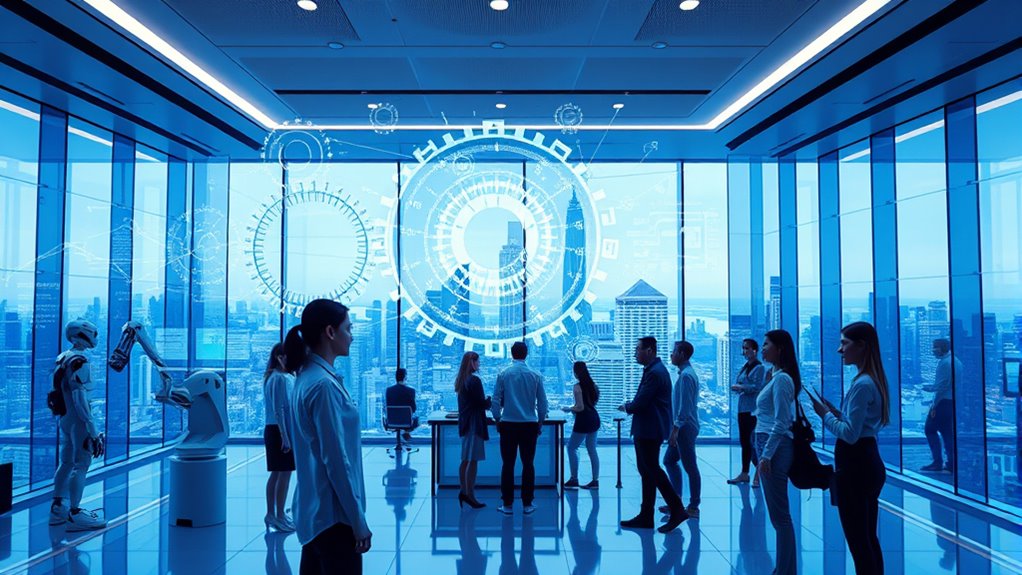Agentic AI is transforming your workplace by automating routine tasks and enabling autonomous decision-making. This shift means some jobs may become obsolete, while new roles require skills in creativity, problem-solving, and emotional intelligence. To thrive, you’ll need to develop soft skills and stay updated on emerging technologies. Embracing change and continuous learning will help you leverage AI as a tool rather than a threat. Keep exploring to find out how you can adapt and succeed in this evolving environment.
Key Takeaways
- Agentic AI enables autonomous decision-making, transforming traditional job roles and increasing the need for oversight and strategic skills.
- Automation of routine tasks shifts workforce focus toward creative, judgment-based roles that require human soft skills.
- Continuous learning and reskilling are essential to adapt to evolving job requirements influenced by AI advancements.
- Soft skills like emotional intelligence and problem-solving become increasingly valuable as AI handles repetitive activities.
- Understanding and collaborating with AI tools empowers workers to leverage automation for enhanced productivity and job security.

As agentic AI systems become more capable of autonomous decision-making, they are substantially transforming the workplace landscape. This shift is primarily driven by the automation impact—where tasks once requiring human intervention are now handled efficiently by intelligent machines. With AI systems taking over routine and repetitive activities, you’ll notice a significant change in job roles across industries. Some jobs may become obsolete, but new opportunities will emerge, demanding different skills. To keep pace, skill adaptation becomes essential. Instead of focusing solely on traditional skill sets, you’ll need to develop capabilities that complement AI’s strengths, such as complex problem-solving, creative thinking, and emotional intelligence.
Adapting skills for AI-driven workplaces requires embracing creativity, problem-solving, and emotional intelligence to stay relevant and thrive.
The automation impact means that roles involving predictable, rule-based tasks are increasingly automated. For you, this may mean stepping away from manual labor or administrative tasks and shifting toward oversight, strategic planning, or areas where human judgment is irreplaceable. As AI systems become more autonomous, they will handle data analysis, customer service interactions, and logistical planning with minimal human input. This can free you to focus on higher-value activities, but only if you adapt your skills accordingly. You’ll need to learn how to work alongside AI tools, understanding their outputs and making informed decisions based on their recommendations. This collaboration is essential for maximizing productivity and staying relevant in your field.
Skill adaptation doesn’t just involve technical know-how; it also means cultivating soft skills that AI cannot replicate, like empathy, negotiation, and creative ideation. As automation takes over more routine tasks, your ability to think critically and manage complex scenarios will become even more valuable. Continuous learning is indispensable—whether through formal education, online courses, or on-the-job training—to prepare for evolving job requirements. Reskilling initiatives will likely become a significant part of workplace strategies, encouraging you to acquire skills that complement automation rather than compete with it. Additionally, staying informed about AI market growth and emerging technologies can give you a competitive edge in adapting to workplace changes.
Furthermore, embracing change and staying proactive about skill development will help you navigate the uncertainties brought about by agentic AI. The more adaptable you are, the better positioned you’ll be to leverage AI as a tool rather than see it as a threat. Ultimately, understanding the automation impact and engaging in ongoing skill adaptation will empower you to thrive in an AI-driven workplace. You’ll find new roles, grow your expertise, and contribute meaningfully in ways that only humans can—balancing technological advancement with your unique capabilities.
Frequently Asked Questions
How Will Agentic AI Impact Gig Economy Jobs?
You’ll find that agentic AI impacts gig economy jobs by automating tasks and creating new opportunities. As AI regulation evolves, it’s essential to focus on worker retraining to stay relevant. You might see some jobs replaced, but you’ll also benefit from new roles that require tech skills. Embracing these changes and adapting through retraining will help you thrive in a shifting gig landscape.
What New Skills Will Workers Need in an Agentic AI Era?
Imagine riding a wave of change—you’ll need to master new skills to stay afloat. In an agentic AI era, you’ll need to sharpen your human-AI collaboration skills, becoming a conductor guiding the symphony of technology. Emotional intelligence will be your anchor, helping you connect deeply with others and navigate complex situations. Adaptability and creative problem-solving will become your compass, steering you through this transformative landscape.
How Can Education Systems Adapt to Ai-Driven Workforce Changes?
You should focus on curriculum redesign to include AI literacy and soft skills like creativity and critical thinking. Teachers need ongoing training to adapt their methods, integrating technology effectively. Schools must foster collaboration and problem-solving, preparing you for an AI-driven workforce. By updating curricula and investing in teacher development, education systems can equip you with the skills needed to thrive amid rapid technological change.
Will Agentic AI Create More Jobs Than It Displaces?
You’ll be interested to know that some studies suggest AI could create up to 58 million new jobs worldwide by 2030. Agentic AI fosters human-AI collaboration, driving AI-driven innovation and opening new opportunities. While it displaces certain roles, it also enables you to work alongside AI, boosting productivity and creativity. Ultimately, AI’s potential to generate more jobs depends on how quickly you adapt and develop new skills to leverage this technology.
What Ethical Considerations Arise From AI Automating Decision-Making?
You need to consider ethical issues like privacy concerns and accountability issues when AI automates decision-making. It’s vital to guarantee sensitive data remains protected and that clear responsibility lines are established if errors occur. You should also think about transparency, making sure AI systems are understandable, and avoid biases that could unfairly influence outcomes. Addressing these concerns helps build trust and promotes responsible AI use.
Conclusion
So, as agentic AI takes on more tasks, you might think it’s all about automation and efficiency. But ironically, it’s really about shifting your skills and adapting faster than ever. Instead of freeing you up, it demands that you become more agile, more tech-savvy, and constantly learning. In the end, the very tools designed to make life easier might just be pushing you to work harder—just in a smarter, more unpredictable world.










